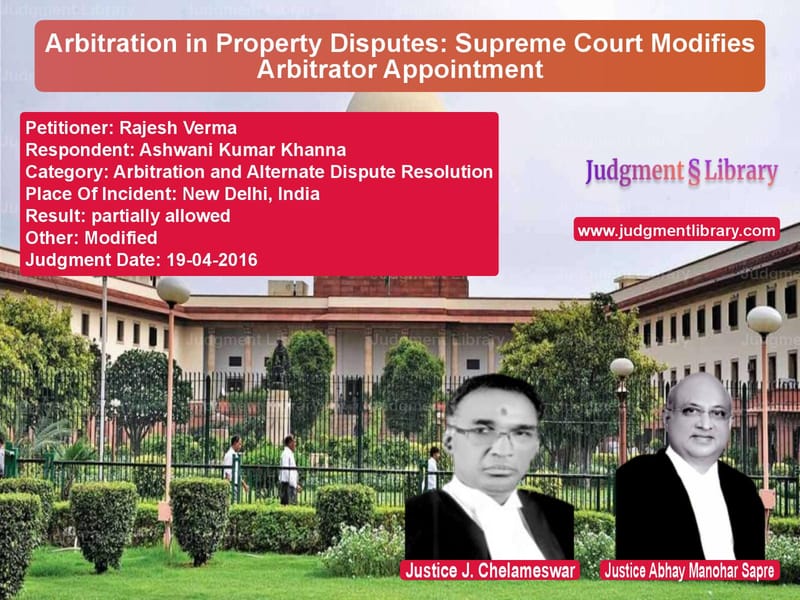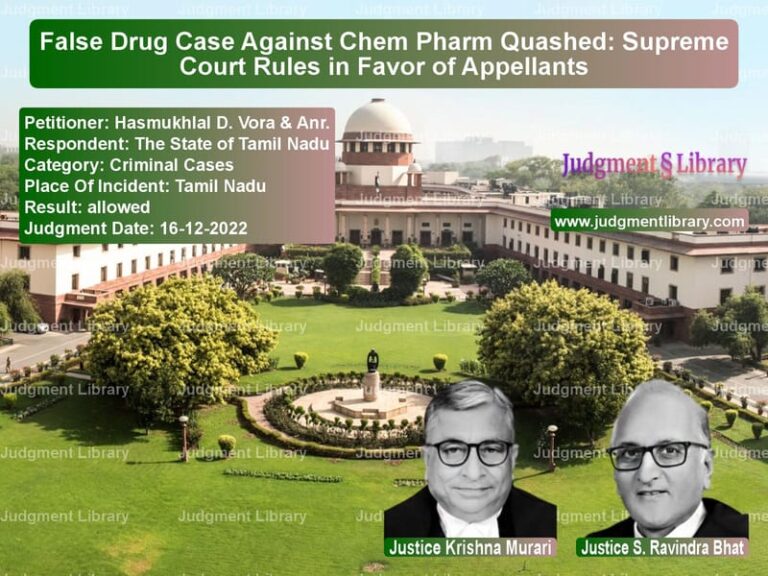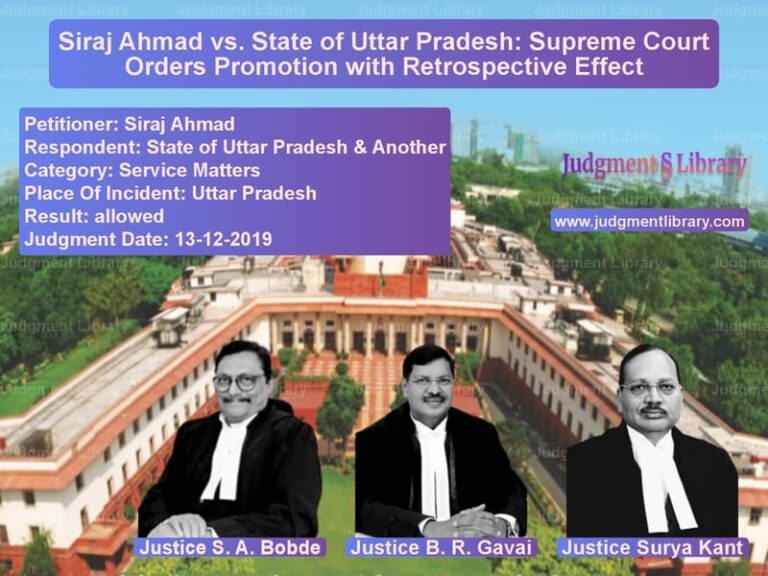Arbitration in Property Disputes: Supreme Court Modifies Arbitrator Appointment
The Supreme Court of India recently ruled in Rajesh Verma v. Ashwani Kumar Khanna, a case that dealt with the arbitration of a property dispute between a landlord and a tenant. The judgment clarified the scope of Section 11 of the Arbitration and Conciliation Act, 1996, and the role of courts in appointing arbitrators in contractual disputes.
Background of the Case
The dispute arose between the appellant, Rajesh Verma (landlord), and the respondent, Ashwani Kumar Khanna (tenant), regarding a shop measuring 153.58 sq. feet located at 1729, Gali No. 5, Govind Puri Extension, Kalkaji, New Delhi. The tenancy began in 1977, with a monthly rent of Rs. 175.
On October 31, 2014, both parties entered into an agreement stipulating that upon the tenant vacating the shop, the landlord would demolish and reconstruct it by March 31, 2015. The new shop was to be sold to the tenant for Rs. 42,00,000, with an advance payment of Rs. 32,00,000. The remaining Rs. 10,00,000 was payable upon execution of the sale deed.
Clause 14 of the agreement contained an arbitration clause, allowing disputes to be resolved through arbitration. However, when disputes arose regarding the agreement’s implementation, both parties exchanged notices alleging breaches.
Eventually, the tenant filed Arbitration Petition No. 434 of 2015 before the Delhi High Court under Section 11 of the Arbitration and Conciliation Act, 1996, seeking the appointment of a sole arbitrator. The High Court allowed the petition and appointed Shri Ashok Chhabra, Advocate, as the arbitrator. The landlord challenged this decision before the Supreme Court.
Legal Issues Considered by the Supreme Court
- Whether the High Court exceeded its jurisdiction under Section 11 of the Arbitration and Conciliation Act by making observations on the merits of the case.
- Whether the appointed arbitrator should be replaced with a retired judge.
- The extent to which a court should intervene in arbitration proceedings.
Arguments by the Petitioner (Rajesh Verma)
- The High Court exceeded its jurisdiction under Section 11 by making findings on the merits of the dispute in paragraphs 9 and 10 of the impugned order.
- The arbitrator should have been appointed with the consent of both parties.
- A retired judge, rather than an advocate, would be more suitable to serve as the arbitrator.
Arguments by the Respondent (Ashwani Kumar Khanna)
- The High Court’s decision was justified since an arbitration agreement existed between the parties.
- The appointment of an arbitrator was necessary given the disputes between the parties.
- The arbitrator should remain unchanged as there was no evidence of bias or incompetence.
Supreme Court’s Judgment
The Supreme Court ruled in favor of modifying the High Court’s order while upholding the arbitration reference. The key findings were:
- The High Court erred by making findings on the merits of the dispute in paragraphs 9 and 10 of its order. These observations were set aside.
- Under Section 11 of the Arbitration and Conciliation Act, courts should only determine whether an arbitration agreement exists and whether disputes have arisen under that agreement.
- The arbitrator appointed by the High Court, Shri Ashok Chhabra, Advocate, was replaced with retired Justice M.L. Mehta to ensure neutrality and fairness.
- The arbitrator was directed to complete the proceedings expeditiously without being influenced by the High Court’s earlier observations.
The Court stated:
“The arbitrator while deciding the disputes between the parties would not, in any manner, be influenced by any findings or observations made by the learned Single Judge in the impugned order.”
The Court also emphasized that arbitration proceedings should be conducted efficiently and without unnecessary judicial interference.
Implications of the Judgment
- Reinforces the principle that courts must refrain from commenting on the merits of a dispute while appointing arbitrators under Section 11.
- Ensures fairness in arbitration proceedings by replacing an advocate arbitrator with a retired judge.
- Clarifies that disputes concerning property agreements with arbitration clauses should be resolved through arbitration, rather than prolonged litigation.
- Strengthens the integrity of the arbitration process by preventing excessive judicial intervention.
Conclusion
The Supreme Court’s ruling in this case strengthens arbitration as an effective dispute resolution mechanism in property disputes. By ensuring that courts limit their role to the appointment of arbitrators without deciding the merits of a case, the judgment upholds the independence of arbitration. The decision also highlights the importance of neutral arbitrators, promoting confidence in the arbitration process.
Don’t miss out on the full details! Download the complete judgment in PDF format below and gain valuable insights instantly!
Download Judgment: Rajesh Verma vs Ashwani Kumar Khanna Supreme Court of India Judgment Dated 19-04-2016-1741854626278.pdf
Direct Downlaod Judgment: Direct downlaod this Judgment
See all petitions in Arbitration Awards
See all petitions in Contract Disputes
See all petitions in Dispute Resolution Mechanisms
See all petitions in Judgment by J. Chelameswar
See all petitions in Judgment by Abhay Manohar Sapre
See all petitions in partially allowed
See all petitions in Modified
See all petitions in supreme court of India judgments April 2016
See all petitions in 2016 judgments
See all posts in Arbitration and Alternate Dispute Resolution Category
See all allowed petitions in Arbitration and Alternate Dispute Resolution Category
See all Dismissed petitions in Arbitration and Alternate Dispute Resolution Category
See all partially allowed petitions in Arbitration and Alternate Dispute Resolution Category







